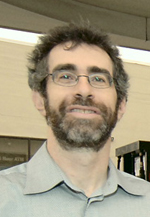Glacial melt found to be faster than thought
Robert Kaufmann on how it happened and why there is no turning back

In what one scientist describes as “clearly a climate signal,” Greenland glaciers have been found to be melting much faster than had been thought, and researchers now believe that they could eventually pour enough water into the oceans to raise global sea levels by 20 feet. In a study conducted by researchers at NASA’s Jet Propulsion Laboratory and the University of Kansas, scientists have learned that the amount of ice flowing into the sea from glaciers in southern Greenland has doubled in the past 10 years, and there is evidence that the melt could soon spread to the massive ice sheets that cover the north of Greenland.
BU Today talked to Robert Kaufmann from the Center for Energy and Environmental Studies, who is a College of Arts and Sciences geography professor, about what this means for our climate and the climate of our children.
BU Today: What’s causing the glacial melt?
Kaufmann: I would assume global warming.
What’s causing global warming?
Human activity is largely responsible for the temperature increase of the last 150 years.
What human activity?
Emitting carbon dioxide into the atmosphere. Emitting methane into the atmosphere. Emitting CFCs [chlorofluorocarbons] into the atmosphere.
Can global warming be slowed or reversed?
In theory it could be slowed, but it is highly unlikely. It would take stopping emissions of all of those gases, so unless we are willing to give up coal and oil and gas, that ain’t gonna happen anytime soon.
Is the Kyoto Accord relevant here?
Even if it were fully adopted, the Kyoto Accord is not going to stop global warming. We have to think of it as a nice first step. Even if it were implemented today, the planet would still be warming, albeit at a slower rate.
What will this kind of glacial melt do to the shorelines of the world?
As glaciers melt, they do two things. They increase the amount of fresh water in the oceans and they increase the sea level. Depending on where the glacier is and depending on the amount of water that melts, it could do something else: it could slow or stop thermohaline circulation, the ocean current that moves between the surface and deeper waters and acts as a conveyer belt, bringing heat north. In the past when this has happened, the earth has cooled, especially Europe.
If it were to happen again, how long would it take to cool?
If glaciers and ice sheets melt at a rapid rate, it could cool in decades. You won’t get an ice sheet the day after tomorrow, but the cooling would be noticeable within decades. We would have a very large problem.
That sounds worrying. How did we manage to make this happen?
We have increased the atmospheric concentration of carbon dioxide from 280 parts per million to about 370 parts per million, and when you put extra molecules of carbon dioxide into the atmosphere, it lasts for about a century. We are committed to global warming. There is nothing we can do about it now.
Is there a formula for increasing carbon dioxide and warming the planet?
If you double the atmospheric concentration of carbon dioxide relative to the 280 parts per million, you increase the temperature about seven degrees Fahrenheit. We have increased the concentration somewhere between a third and a half. Global temperatures have risen over a degree in the last 150 years. We see that very clearly.
Does all of this alarm you?
Yeah!